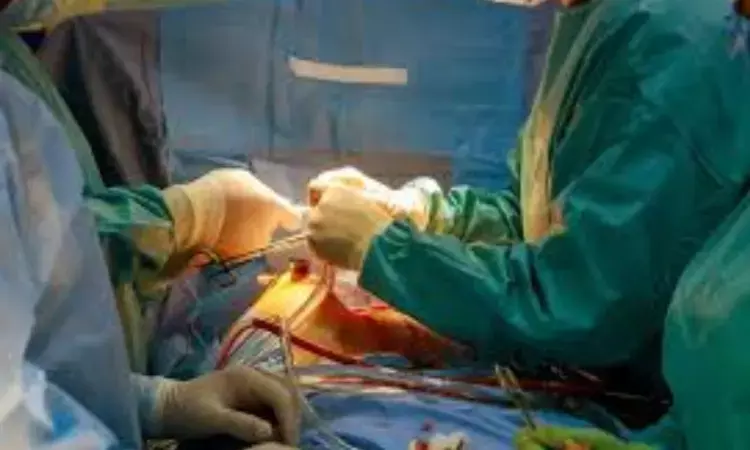- Home
- Medical news & Guidelines
- Anesthesiology
- Cardiology and CTVS
- Critical Care
- Dentistry
- Dermatology
- Diabetes and Endocrinology
- ENT
- Gastroenterology
- Medicine
- Nephrology
- Neurology
- Obstretics-Gynaecology
- Oncology
- Ophthalmology
- Orthopaedics
- Pediatrics-Neonatology
- Psychiatry
- Pulmonology
- Radiology
- Surgery
- Urology
- Laboratory Medicine
- Diet
- Nursing
- Paramedical
- Physiotherapy
- Health news
- Fact Check
- Bone Health Fact Check
- Brain Health Fact Check
- Cancer Related Fact Check
- Child Care Fact Check
- Dental and oral health fact check
- Diabetes and metabolic health fact check
- Diet and Nutrition Fact Check
- Eye and ENT Care Fact Check
- Fitness fact check
- Gut health fact check
- Heart health fact check
- Kidney health fact check
- Medical education fact check
- Men's health fact check
- Respiratory fact check
- Skin and hair care fact check
- Vaccine and Immunization fact check
- Women's health fact check
- AYUSH
- State News
- Andaman and Nicobar Islands
- Andhra Pradesh
- Arunachal Pradesh
- Assam
- Bihar
- Chandigarh
- Chattisgarh
- Dadra and Nagar Haveli
- Daman and Diu
- Delhi
- Goa
- Gujarat
- Haryana
- Himachal Pradesh
- Jammu & Kashmir
- Jharkhand
- Karnataka
- Kerala
- Ladakh
- Lakshadweep
- Madhya Pradesh
- Maharashtra
- Manipur
- Meghalaya
- Mizoram
- Nagaland
- Odisha
- Puducherry
- Punjab
- Rajasthan
- Sikkim
- Tamil Nadu
- Telangana
- Tripura
- Uttar Pradesh
- Uttrakhand
- West Bengal
- Medical Education
- Industry
Leaflet Modification Proves Promising for Transcatheter Aortic Valve Implantation in ShortCut Study

USA: In cardiac interventions, transcatheter aortic valve implantation (TAVI) stands as a beacon of hope for patients with severe aortic stenosis. However, the procedure has challenges, particularly concerning coronary obstruction risk. In a recent breakthrough study titled the ShortCut study, a novel approach involving leaflet modification before TAVI has shown promising results in mitigating this risk.
The study, published in the European Heart Journal, found that modifying failed bioprosthetic aortic valve leaflets using ShortCut, the first dedicated leaflet modification device, is safe, achieved successful leaflet splitting in all patients, and was tied to favorable clinical outcomes in patients at risk for coronary obstruction undergoing TAVI.
No patients died, and only one disabling stroke occurred during the procedure. The findings were presented at the EuroPCR 2024 by Danny Dvir from the Hebrew University of Jerusalem in Israel.
This trial was conducted to assess the efficacy and safety of ShortCut before transcatheter aortic valve implantation in patients at risk for coronary artery obstruction.
For this purpose, the researchers conducted a pivotal prospective study enrolling patients with failed bioprosthetic aortic valves scheduled to undergo TAVI and were at risk for coronary artery obstruction.
The primary safety endpoint was procedure-related stroke or mortality at discharge or seven days, and the primary efficacy endpoint was per-patient leaflet splitting success. Independent echocardiographic, angiographic, and computed tomography core laboratories assessed all images. A clinical events committee and data safety monitoring board adjudicated the safety events.
The following were the key findings of the study:
- Sixty eligible patients were treated (77.0 ± 9.6 years, 70% female, 96.7% failed surgical bioprosthetic valves, 63.3% single splitting and 36.7% dual splitting) at 22 clinical sites.
- All (100%) patients achieved successful leaflet splitting.
- Procedure time, including imaging confirmation of leaflet splitting, was 30.6 ± 17.9 min.
- Freedom from the primary safety endpoint was achieved in 59 (98.3%) patients, with no mortality and one (1.7%) disabling stroke.
- At 30 days, freedom from coronary obstruction was 95%.
- Within 90 days, freedom from mortality was 95%, without cardiovascular deaths.
The findings showed that a first-of-its-kind device used to slice through the leaflets of a failed bioprosthetic valve to forestall coronary artery obstruction during reintervention is easy to use and safe as an add-on during repeat valve procedures.
While further research and validation are warranted to confirm the long-term efficacy and safety of leaflet modification, the initial results of the ShortCut study herald a new era in the evolution of TAVI techniques. With ongoing advancements in cardiovascular medicine, patients facing aortic valve disease can look forward to safer and more effective treatment options on the horizon.
Reference:
Dvir, D., Tchétché, D., Leon, M. B., Généreux, P., Seguy, B., Makkar, R., Pibarot, P., Gada, H., Nazif, T., Kempfert, J., Dumonteil, N., Unbehaun, A., Modine, T., Whisenant, B., Caussin, C., Conradi, L., Waggoner, T., Mishell, J. M., Chetcuti, S. J., . . . Kodali, S. Leaflet modification before transcatheter aortic valve implantation in patients at risk for coronary obstruction: The ShortCut study. European Heart Journal. https://doi.org/10.1093/eurheartj/ehae303
Dr Kamal Kant Kohli-MBBS, DTCD- a chest specialist with more than 30 years of practice and a flair for writing clinical articles, Dr Kamal Kant Kohli joined Medical Dialogues as a Chief Editor of Medical News. Besides writing articles, as an editor, he proofreads and verifies all the medical content published on Medical Dialogues including those coming from journals, studies,medical conferences,guidelines etc. Email: drkohli@medicaldialogues.in. Contact no. 011-43720751


